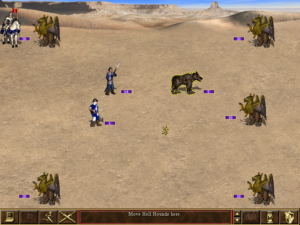Heroes Chronicles: Losing Balance
It strikes me that Heroes of Might and Magic (as revealed through the Heroes Chronicles) has a balance problem. Not that it’s unbalanced exactly, but that it loses its balance easily. It’s a very high positive-feedback game, which is to say, power is rewarded with more power, so the winners tend to keep on winning and the losers tend to keep on losing. The outcome of a scenario rests on the first few turns. If you can pull ahead then, there’s no stopping you. But there’s no stopping the scenario, either: even if victory is assured, you have to keep playing it out to get credit for it.
This is especially visible in the second level of Conquest of the Underworld. The goal in this scenario isn’t to wipe out all enemies and conquer the map, but to obtain a certain artifact that’s at the end of a sequence of map-spanning fetch-quests. Wiping out all enemies and conquering the map does, however, make the questing much easier. In fact, I find that the easiest way to approach the level is to concentrate on securing the terrain first, hitting the enemy castles while they’re still weak, and not go out of your way to cart plot tokens around until the conquest is complete. This probably isn’t the approach that the level designer had in mind. At least, I hope not, because it’s kind of boring: it leaves you with a bunch of time-consuming tasks to pursue after you’ve removed all challenge.
I suppose this is an example of one of the classic injustices of game design: if there are two ways of accomplishing something, one that’s difficult and interesting and one that’s easy and boring, players will choose the boring way and then blame the designer. But in this instance, I’m not really sure what the other option is. Some of the quests in the chain involved finding particular artifacts, with no clues to their locations. This isn’t something you can really pursue. All you can do is peek in on any ruins you pass by in the hope of lucking out, which is something you’d be doing anyway.
 Comments(0)
Comments(0)